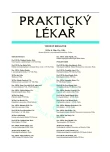-
Medical journals
- Career
Dementia in a general practitioner‘s office
Authors: J. Fiala
Authors‘ workplace: Přednosta: doc. MUDr. Otakar Keller, CSc. ; Primářka: MUDr. Jolana Marková ; Neurologická klinika Fakultní Thomayerovy nemocnice a IPVZ, Praha
Published in: Prakt. Lék. 2009; 89(9): 488-493
Category: Various Specialization
Overview
Dementia is a permanent cognitive desarangement in comparison to a premorbid level of cognitive performance leading to patient disability to manage acitivities in daily living. Alzheimer’s disease, vascular and mixed dementia and dementia with Lewy bodies are the most common types. To estabilish a diagnosis requires a history of on-lasting problems in managing previously normaly coped activities, behavioral problems, physical examination, brain imaging (computed tomography or magnetic resonance imaging) as well as a basic laboratory tests. Referral to a neurologist or psychiatrist specializing in dementia care should be considered, particularly in atypical cases.
Early diagnosis is important mainly in order to exclude dementia mimicking and/or potentially treatable conditions. In addition to appropriate farmacological management, patient and caregiver education and provision of psychochosocial support are essential.Key words:
dementia, care, review.
Sources
1. Aarsland, D. Andersen, K. Larsen, J. et al. Risk of dementia in Parkinson’s disease. A community based, prospective study. Neurology 2001, 56(6), p. 730–736.
2. American Psychiatric Association. Diagnostic and Statistical Manual of Mental Disorders. 4. American Psychiatric Association; Washington DC, USA: 1994. Dementia of the Alzheimer’s type.
3. Ballard, C.G. Definition and diagnosis of dementia with Lewy bodies. Dement. Geriatr. Cogn. Disord. 2004, 17 (suppl 1), p. 15-24.
4. de al Torre, J.C. Alzheimer disease as a vascular disorder: nosological evidence. Stroke 2002, 33, p. 1152-1162.
5. Folstein, M., Folstein, S., McHugh, P. Mini-mental state: a practical method for grading the cognitive state of patients for the clinician. J. Psychiatr. Res. 1975, 12(3), p. 189-198.
6. Hodges, J., Putnam, K., Grafman, J. Clinicopathological correlates in frontotemporal dementia. Ann. Neurol. 2006, 56, p. 399–406.
7. Holmerová, I. Demence a deprese ve vyšším věku. Med. pro praxi 2009, 6(2), p. 111-114.
8. Holmerová, I., Jarolímová, E., Nováková, H. Alzheimerova nemoc v rodině. Praha: Pfizer, spol. s.r.o, 2004. Dostupné také na WWW: <http://www. gerontologie.cz/files/alzheimerova_nemoc_v_rodine.pdf>
9. Hort, J., Rusina, R. a kol. Paměť a její poruchy. Praha: Maxdorf 2007, ISBN 978-80-7345-004-5.
10. Huey, E., Putnam, K., Grafman, J. A systematic review of neurotransmitter deficits and treatments in frontotemporal dementia. Neurology 2006, 66(1), p. 17–22.
11. Jirák, R. Aktuální pohled na léčbu Alzheimerovy nemoci. Farmakoterapie 8/2006 - psychiatrie, s. 593-597.
12. McCurry, S.M., Gibbons, L.E., Logsdon, R.G. et al. Training caregivers to change the sleep hygiene practices of patients with dementia: the NITE-AD project. J. Am. Geriatr. Soc. 2003, 51, p. 1455-1460.
13. McKeith, I.G., Dickson, D.W., Lowe, J. Diagnosis and management of dementia with Lewy bodies. Third report of the DLB consortium. Neurology 2005, 65, p. 1863–1872.
14. Neary, D., Snowden, J., Mann, D. Frontotemporal dementia. Lancet Neurol. 2005, 4, p. 771 – 780.
15. Petersen, R.C. Mild cognitive impairment as a diagnostic entity. J. Intern. Med. 2004, 256, p. 183-194.
16. Ressner, P., Hort, J. Rektorová, I. a kol. Doporučené postupy pro diagnostiku Alzheimerovy nemoci a dalších onemocnění spojených s demencí. Cesk. Slov. Neurol. 2008; 71/104, 4, s. 494-501.
17. Scott, K.R., Barrett, A.M. Dementia syndromes: evaluation and treatment. Expert. Rev. Neurother. 2007, 7(4), p. 407-422.
18. Sink, K., Holden, K., Yaffe, K. Parmacological treatment of neuropsychiatric symptoms of dementia: a review of the evidence. JAMA 2005, 293(5), p. 596–608.
19. Szirmai, I.,Vastagh, I., Szombathelyi, E. et al. Strategic infarcts of the thalamus in vascular dementia. J. Neurol. Sci. 2002, 203-204, p. 91-97.
20. Thomas, A.J., O’Brien, J.T. Depression and cognition in older adults. Current Opinion in Psychiatry 2008, 21, p. 8-13.
Labels
General practitioner for children and adolescents General practitioner for adults
Article was published inGeneral Practitioner

2009 Issue 9-
All articles in this issue
- Burn out syndrome and assessment doctors
- Depression and anxiety in pregnant women
- Concept of discipline General Practice
- Previously expressed wishes or about human freedom and dignity
- Echocardiography and anticoagulation treatment of patients with cardioembolic stroke
- Dementia in a general practitioner‘s office
- Deliberate self-harm – a serious symptom and dangerous social phenomenon
- A comparison of the lifestyles of young healthy women with different smoking behaviours
- General Practitioner
- Journal archive
- Current issue
- Online only
- About the journal
Most read in this issue- Depression and anxiety in pregnant women
- Deliberate self-harm – a serious symptom and dangerous social phenomenon
- Dementia in a general practitioner‘s office
- Echocardiography and anticoagulation treatment of patients with cardioembolic stroke
Login#ADS_BOTTOM_SCRIPTS#Forgotten passwordEnter the email address that you registered with. We will send you instructions on how to set a new password.
- Career

